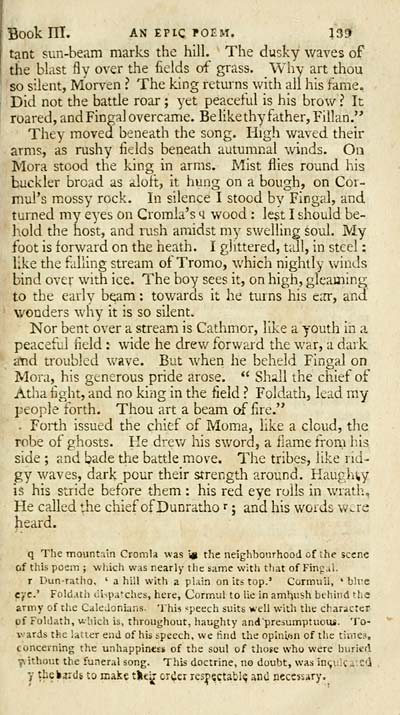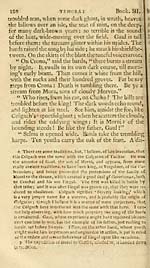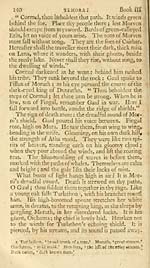Download files
Complete book:
Individual page:
Thumbnail gallery: Grid view | List view

Book III. AN EPIC POEM. 139
tant sun-he;im marks the hilL The dusky waves of
the blast fly over the fields of grass. Why art thou
so silent, Morven ? The king returns with all his fame.
Did not the battle roar ; yet peaceful is his brow ? It
roared, and Fingal overcame. Be likethy father, Fillan."
They moved beneath the song. High waved their
arms, as rushy fields beneath autumnal winds. On
Mora stood the king in arms. Mist flies round his
buckler bread as iloft, it hung on a bough, on Cor-
mul's m.ossy rock. In silence I stood by Firgal, and
turned my eyes on Gromla's 4 wood : lest I should be-
hold the host, and rush amidst my swelling soul. My
foot is forward on the heath. I glittered, tall, in steel :
like the f dling stream of Tromo, which nightly vv^inds
bind over with ice. The boy sees it, on high, gleaming
to the early beam : towards it he turns his ear, and
wonders why it is so silent.
Nor bent over a stream is Cathmor, like a youth in a
peaceful field : wide he drew forward the war, a dark
and troubled wave. But when he beheld Fingal on
Mora, his generous pride arose. " Shall the chief of
Atha fight, and no king in the field ? Foldath, lead my
people forth. Thou art a beam of fire."
. Forth issued the chief of Moma, like a cloud, the
robe of ghosts. Ke drev/ his sword, a flame from Ins
side ; and bade the battle move. The tribes, like rid-
gy waves, dark pour their strength around. Haughvy
is his stride before them : his red eye rolls in wrath.
He called the chief of Dunratho r ; and his words w^re
heard.
q The mountain Cromla was '« the neighbourhood of the scene
of this poem ; which was nearly the same with that of Fing.il.
r Dun-ratho, ' a hill with a plain on its top.' Cormuil, • blre
c>c.' Fold.uh t;i^l)a'•ches, here, Cormul to lie in aml^iish behind the
army of the Caledonians. This speech suits well with the character
pf Foldath, which is, throughout, haughty and presumptuous. To-
wards the latter end of his speech, we tind the opinion of the times
concerning the unhappincss of the soul of those who were buried
7\ ithout the funeral song. This doctrine, no doubt, was in^iiic .c ci
y theksids to make tlle^ crCcr lesy qctatl? and necessary.
tant sun-he;im marks the hilL The dusky waves of
the blast fly over the fields of grass. Why art thou
so silent, Morven ? The king returns with all his fame.
Did not the battle roar ; yet peaceful is his brow ? It
roared, and Fingal overcame. Be likethy father, Fillan."
They moved beneath the song. High waved their
arms, as rushy fields beneath autumnal winds. On
Mora stood the king in arms. Mist flies round his
buckler bread as iloft, it hung on a bough, on Cor-
mul's m.ossy rock. In silence I stood by Firgal, and
turned my eyes on Gromla's 4 wood : lest I should be-
hold the host, and rush amidst my swelling soul. My
foot is forward on the heath. I glittered, tall, in steel :
like the f dling stream of Tromo, which nightly vv^inds
bind over with ice. The boy sees it, on high, gleaming
to the early beam : towards it he turns his ear, and
wonders why it is so silent.
Nor bent over a stream is Cathmor, like a youth in a
peaceful field : wide he drew forward the war, a dark
and troubled wave. But when he beheld Fingal on
Mora, his generous pride arose. " Shall the chief of
Atha fight, and no king in the field ? Foldath, lead my
people forth. Thou art a beam of fire."
. Forth issued the chief of Moma, like a cloud, the
robe of ghosts. Ke drev/ his sword, a flame from Ins
side ; and bade the battle move. The tribes, like rid-
gy waves, dark pour their strength around. Haughvy
is his stride before them : his red eye rolls in wrath.
He called the chief of Dunratho r ; and his words w^re
heard.
q The mountain Cromla was '« the neighbourhood of the scene
of this poem ; which was nearly the same with that of Fing.il.
r Dun-ratho, ' a hill with a plain on its top.' Cormuil, • blre
c>c.' Fold.uh t;i^l)a'•ches, here, Cormul to lie in aml^iish behind the
army of the Caledonians. This speech suits well with the character
pf Foldath, which is, throughout, haughty and presumptuous. To-
wards the latter end of his speech, we tind the opinion of the times
concerning the unhappincss of the soul of those who were buried
7\ ithout the funeral song. This doctrine, no doubt, was in^iiic .c ci
y theksids to make tlle^ crCcr lesy qctatl? and necessary.
Set display mode to: Large image | Transcription
Images and transcriptions on this page, including medium image downloads, may be used under the Creative Commons Attribution 4.0 International Licence unless otherwise stated. ![]()
| Early Gaelic Book Collections > Ossian Collection > Poems of Ossian, the son of Fingal > Volume 2 > (149) |
|---|
| Permanent URL | https://digital.nls.uk/77914544 |
|---|
| Shelfmark | Oss.54 |
|---|---|
| Attribution and copyright: |
|
| Description | Selected books from the Ossian Collection of 327 volumes, originally assembled by J. Norman Methven of Perth. Different editions and translations of James MacPherson's epic poem 'Ossian', some with a map of the 'Kingdom of Connor'. Also secondary material relating to Ossianic poetry and the Ossian controversy. |
|---|
| Description | Selected items from five 'Special and Named Printed Collections'. Includes books in Gaelic and other Celtic languages, works about the Gaels, their languages, literature, culture and history. |
|---|

